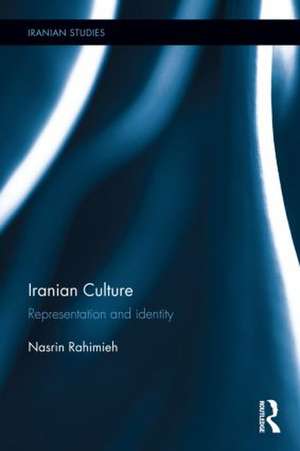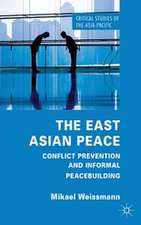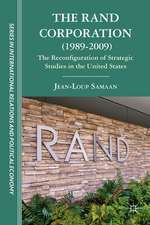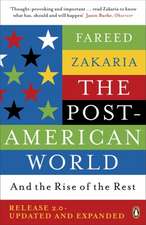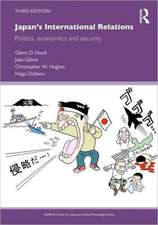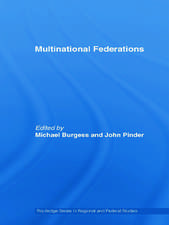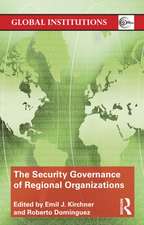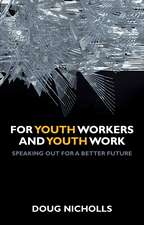Iranian Culture: Representation and Identity: Iranian Studies
Autor Nasrin Rahimiehen Limba Engleză Hardback – 7 sep 2015
Iranian Culture: Representation and Identity demonstrates these fissures and the incompatibilities that refuse to be written out of national culture, analysing works of literature, popular music, graphic art and film, as well as oral narratives. Using works produced before and after the 1979 revolution, created both inside and outside of Iran, this study reveals neglected complexities and contradictions in the field of Iranian cultural production. It considers how contested claims to culture, whether they originated in Iran or the Iranian diaspora, shape our understanding of this culture and what spaces they create for new articulations of it, and in doing so offers an important re-examination of our collective concept of culture.
This book would be an excellent resource for students and scholars of Middle East Studies and Iranian Studies, specifically Iranian culture including film and contemporary literature and the Iranian diaspora.
| Toate formatele și edițiile | Preț | Express |
|---|---|---|
| Paperback (1) | 449.41 lei 43-57 zile | |
| Taylor & Francis – 16 iun 2017 | 449.41 lei 43-57 zile | |
| Hardback (1) | 1052.35 lei 43-57 zile | |
| Taylor & Francis – 7 sep 2015 | 1052.35 lei 43-57 zile |
Din seria Iranian Studies
-
 Preț: 154.25 lei
Preț: 154.25 lei -
 Preț: 310.03 lei
Preț: 310.03 lei - 18%
 Preț: 1053.92 lei
Preț: 1053.92 lei - 18%
 Preț: 1108.37 lei
Preț: 1108.37 lei - 25%
 Preț: 823.63 lei
Preț: 823.63 lei - 25%
 Preț: 823.99 lei
Preț: 823.99 lei -
 Preț: 449.41 lei
Preț: 449.41 lei - 18%
 Preț: 1068.18 lei
Preț: 1068.18 lei - 18%
 Preț: 997.90 lei
Preț: 997.90 lei -
 Preț: 389.38 lei
Preț: 389.38 lei - 18%
 Preț: 1055.51 lei
Preț: 1055.51 lei - 12%
 Preț: 299.52 lei
Preț: 299.52 lei -
 Preț: 442.68 lei
Preț: 442.68 lei - 18%
 Preț: 1059.84 lei
Preț: 1059.84 lei - 26%
 Preț: 848.57 lei
Preț: 848.57 lei - 25%
 Preț: 770.09 lei
Preț: 770.09 lei -
 Preț: 341.55 lei
Preț: 341.55 lei - 18%
 Preț: 1165.97 lei
Preț: 1165.97 lei -
 Preț: 437.13 lei
Preț: 437.13 lei - 18%
 Preț: 1168.76 lei
Preț: 1168.76 lei -
 Preț: 436.14 lei
Preț: 436.14 lei - 18%
 Preț: 1117.07 lei
Preț: 1117.07 lei -
 Preț: 478.86 lei
Preț: 478.86 lei - 25%
 Preț: 570.60 lei
Preț: 570.60 lei - 18%
 Preț: 1114.70 lei
Preț: 1114.70 lei - 26%
 Preț: 822.01 lei
Preț: 822.01 lei - 18%
 Preț: 1000.27 lei
Preț: 1000.27 lei - 18%
 Preț: 1060.52 lei
Preț: 1060.52 lei -
 Preț: 412.70 lei
Preț: 412.70 lei - 18%
 Preț: 1054.71 lei
Preț: 1054.71 lei - 22%
 Preț: 328.20 lei
Preț: 328.20 lei -
 Preț: 430.94 lei
Preț: 430.94 lei - 18%
 Preț: 1055.51 lei
Preț: 1055.51 lei - 18%
 Preț: 1002.63 lei
Preț: 1002.63 lei - 25%
 Preț: 685.71 lei
Preț: 685.71 lei - 18%
 Preț: 1067.14 lei
Preț: 1067.14 lei - 18%
 Preț: 1118.65 lei
Preț: 1118.65 lei - 18%
 Preț: 1054.75 lei
Preț: 1054.75 lei
Preț: 1052.35 lei
Preț vechi: 1283.35 lei
-18% Nou
Puncte Express: 1579
Preț estimativ în valută:
201.39€ • 208.98$ • 168.33£
201.39€ • 208.98$ • 168.33£
Carte tipărită la comandă
Livrare economică 17-31 martie
Preluare comenzi: 021 569.72.76
Specificații
ISBN-13: 9781138913783
ISBN-10: 1138913782
Pagini: 170
Ilustrații: 5 black & white illustrations, 5 black & white halftones
Dimensiuni: 156 x 234 x 15 mm
Greutate: 0.39 kg
Ediția:1
Editura: Taylor & Francis
Colecția Routledge
Seria Iranian Studies
Locul publicării:Oxford, United Kingdom
ISBN-10: 1138913782
Pagini: 170
Ilustrații: 5 black & white illustrations, 5 black & white halftones
Dimensiuni: 156 x 234 x 15 mm
Greutate: 0.39 kg
Ediția:1
Editura: Taylor & Francis
Colecția Routledge
Seria Iranian Studies
Locul publicării:Oxford, United Kingdom
Public țintă
Postgraduate and UndergraduateCuprins
Introduction Chapter One Back to the Future: Time Travel and Iranian Identity Chapter Two: Shooting the Past, Staging the Revolution Chapter Three Stage Managing the Return of the Repressed Chapter Four From the Displaced to the Misplaced Chapter Five The Hen’s Husband, or Deterritorializations of Persian Chapter Six Illuminating Internal Alterities Conclusion
Recenzii
"The book is a major addition to the existing studies in Iranian culture and identity and broadens our understanding of the complexities inherent in Iranian culture and the ways Iranians are constantly performing their identities.While the book will be of significant interest to scholars of Iranian and Middle Eastern studies, it will also be of interest to specialists of diaspora studies, cultural studies, film studies, and literary criticism. Rahimieh’s graceful writing style and incorporation of various cultural productions will help make the topic available to a wide readership."
Claudia Yaghoobi -Assistant Professor of International Literature, Georgia College and State University in the Journal of the Society for Contemporary Thought and the Islamicate World January 2016.
Claudia Yaghoobi -Assistant Professor of International Literature, Georgia College and State University in the Journal of the Society for Contemporary Thought and the Islamicate World January 2016.
Descriere
Iranian Culture: Representation and Identity demonstrates these fissures and the incompatibilities that refuse to be written out of national culture, analysing works of literature, popular music, graphic art and film, as well as oral narratives. Using works produced before and after the 1979 revolution, created both inside and outside of Iran, this study reveals neglected complexities and contradictions in the field of Iranian cultural production. It considers how contested claims to culture, whether they originated in Iran or the Iranian diaspora, shape our understanding of this culture and what spaces they create for new articulations of it, and in doing so offers an important re-examination of our collective concept of culture.
